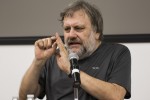UCLA’s Program in Experimental Critical Theory (ECT) aims to expand discourse in theory beyond the boundaries of academia to wider publics through provocative public programs. This past weekend, director of ECT and UCLA Professor Kenneth Reinhard organized a series of free, public lectures with internationally recognized philosophers Slavoj Žižek, Mladen Dolar, and Alenka Zupančič.
TRANSCRIPT:
Mehta: This past weekend, internationally renowned philosopher Slavoj Žižek visited UCLA for a lecture as part of a series affiliated with the UCLA Program in Experimental Critical Theory, or ECT, a seminar with related public lectures directed by UCLA professor Kenneth Reinhard. Mladen Dolar and Alenka Zupančič also gave lectures in conjunction with Žižek’s Thursday and Friday to contribute to this quarter’s ECT seminar topic, “Truth, Knowledge, and the Unconscious.” The title, Experimental Critical Theory, could be interpreted in a number of ways. Professor Reinhard explains what this pioneering program at UCLA really is.
Reinhard: Theory literally comes from the Greek word for “to see,” so we’re talking about seeing from the larger perspective when we’re talking about theory. So theory is an attempt to universalize – to get at the larger issues behind particular events. Criticism, in terms of the second, you know in terms of Experimental Critical theory – you know, criticism is to imply the limits to universalization. And finally, to experiment means to really create new ideas, new thoughts.
Mehta: What is important about this program is what the “experimental” portion of the title implies, as Reinhard elaborates.
Reinhard: We look to both the sciences and the arts to look for models of experimentation. And so in that sense, experimentation implies for us that the project of critical theory is not settled, it’s not over. It’s something that’s still developing, expanding, and we need to be experimental with it, too. Not simply take it as a body of ideas that we simply learn from. We have to continue making new ideas.
Žižek: I am also glad together with Alenka and Mladen to be here and explain all these things because I am not joking here, you know, we do live in dark times in what once we called, counter-revolution.
Mehta: That was Slavoj Žižek with his distinctive voice, introducing current social topics in relation to his vast range of theoretical works. While it would be likely to assume that such a lecture could seem boring and difficult to grapple with unless one is well-versed in philosophy, what is unique about public activities put on by Professor Reinhard in association with the ECT program is that, as he explains, it aims to break down barriers surrounding theory to open up discourse to everyone.
Reinhard: All of these (are) extremely complicated fields in themselves, which they have all done very important pioneering work in bringing together. That’s wonderful, but it also needs to be explained, clarified, exemplified, and they’re all amazingly good at making these difficult concepts immediately accessible with examples from popular culture, from the history of literature, from everyday life.
Mehta: For example, Žižek challenges issues that are typically “left wing or right wing.” He claims that taking sides in a conflict oversimplifies major issues like violent wars, and doesn’t necessarily make progress toward freedom.
Žižek: So, you know, that’s my ideal world. I claim, as I put it pathetically in the interview for the German Weekly recently, if we lose this battle on the two fronts, if we choose sides, then as Alain Badiou would have said, we have lost the emancipatory struggle, we can just kill ourselves.
Mehta: One would imagine dense topics in theory would draw in only involved academics in the ECT program. But opened to the public, the room was filled, buzzing with laughter and questions, as Žižek, in his animated style, broke down some of the greatest challenges that face our society.
This is exactly the goal of ECT programs that are open to the public: to engage audiences with great thinkers in a way that encourages discussion in unconventional and enjoyable ways. Third-year exchange student from Germany, Ulrike Carrillo, and third-year philosophy and English student Nick Ruzicka both attended the lecture and shared their thoughts on what brought them to it.
Carrillo: Yeah, so, I think this was a very non-typical philosophy lecture. And I think that’s what really makes it special. He’s kind of like – Žižek is kind of the pop-star of philosophy. I mean you heard it, he’s very provocative, vulgar, he’s also very accessible to people. Like I am leaving this lecture with my brain percolating right now.
Ruzicka: I’ve been into philosophy since I was young, why humans act a certain way. So I have an interest in Freudian psychoanalysis, Lacan. And Žižek is a Lacanian psychoanalyst, as you know, and he uses Lacan to critique culture. And I find that fascinating.
Mehta: Professor Reinhard hopes to introduce a wide array of topics of discussion to students from all fields through a certification in Experimental Critical Theory – but more importantly, to open up ECT to students, professors, and the community at large to the important topics that great thinkers like Žižek, Dolar, and Zupančič work on.
Reinhard: When we have people like Slavoj come in and make things clearer, it gets a kind of real materiality that makes it available. So yes, I think the point is that we should all be reading and studying these important texts and ideas, but we also want people to talk about them, and have them opened as a kind of discussion. Not simply in the classroom or locked in the academy.
Mehta: For information on upcoming ECT lectures, you can visit ect.humnet.ucla.edu. For Daily Bruin Radio, this is Jonaki Mehta.
